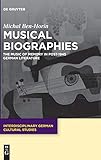Musical Biographies : The Music of Memory in Post-1945 German Literature / Michal Ben-Horin.
Material type: TextSeries: Interdisciplinary German Cultural Studies ; 20Publisher: Berlin ; Boston : De Gruyter, [2016]Copyright date: ©2016Description: 1 online resource (VIII, 173 p.)Content type:
TextSeries: Interdisciplinary German Cultural Studies ; 20Publisher: Berlin ; Boston : De Gruyter, [2016]Copyright date: ©2016Description: 1 online resource (VIII, 173 p.)Content type: - 9783110457957
- 9783110460469
- 9783110460933
- German fiction -- History and criticism -- 20th century
- German fiction -- 20th century -- History and criticism
- Memory in literature
- Music and literature -- History -- 20th century -- Austria
- Music and literature -- History -- 20th century -- Germany
- Music and literature -- Austria -- History -- 20th century
- Music and literature -- Germany -- History -- 20th century
- Music in literature -- Austria -- Germany -- Criticism, interpretation, etc -- History
- Music in literature
- Erzählwissenschaft
- Holocaust
- Kultur / Deutschland
- Musikalische Poetik
- SOCIAL SCIENCE / General
- German culture
- Holocaust
- Musical Poetics
- narrative
- 830.9/3578 23
- ML3849 .B35 2016
- online - DeGruyter
- Issued also in print.
| Item type | Current library | Call number | URL | Status | Notes | Barcode | |
|---|---|---|---|---|---|---|---|
 eBook
eBook
|
Biblioteca "Angelicum" Pont. Univ. S.Tommaso d'Aquino Nuvola online | online - DeGruyter (Browse shelf(Opens below)) | Online access | Not for loan (Accesso limitato) | Accesso per gli utenti autorizzati / Access for authorized users | (dgr)9783110460933 |
Frontmatter -- Acknowledgments -- Contents -- Overture. German Catastrophe and the Rebirth of Musical Biography -- 1. Thomas Mann: Dissonance as a Mode of Documentation -- Interlude I. Siegfried: Atonality and Decentralized Narrative -- 2. Günter Grass: Rhythms of a Fictitious Testimony -- Interlude II. Clown: Ironic Tune between Memory and Oblivion -- 3. Ingeborg Bachmann: The Resonance of Trauma -- Interlude III. Pianist: Austria from a Musician’s Perspective -- 4. Thomas Bernhard: Writing, Playing, and the Compulsion to Repeat -- Interlude IV. Composer: Sound Transfiguration after Reunification -- Coda. The End of Musical Biography? -- Bibliography -- Index
restricted access online access with authorization star
http://purl.org/coar/access_right/c_16ec
Since the second half of the twentieth century various routes, including history and literature, are offered in dealing with the catastrophe of World War II and the Holocaust. Historiographies and novels are of course written with words; how can they bear witness to and reverberate with traumatic experience that escapes or resists language? In search for an alternative mode of expression and representation, this volume focuses on postwar German and Austrian writers who made use of music in their exploration of the National Socialist past. Their works invoke, however, new questions: What happens when we cross the line between narration and documentation, and between memory and a musical piece? How does identification and fascination affect our reading of the text? What kind of ethical issues do these testimonies raise? As this volume shows, reading these musical biographies is both troubling and compelling since they ‘fail’ to come to terms with the past. In playing the haunting music that does not let us put the matter to rest, they call into question not only the exclusion of personal stories by official narratives, but also challenge writers’ and readers’ most intimate perspectives on an unmasterable past.
Issued also in print.
Mode of access: Internet via World Wide Web.
In English.
Description based on online resource; title from PDF title page (publisher's Web site, viewed 25. Jun 2024)


